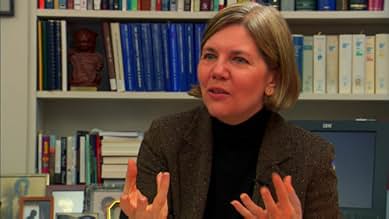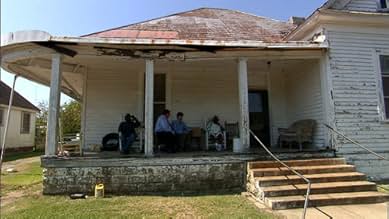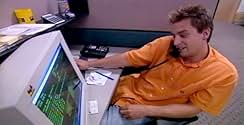Adicionar um enredo no seu idiomaWhen Hurricane Katrina ravaged America's Gulf Coast, it laid bare an uncomfortable reality-America is not only far from the world's wealthiest nation; it is crumbling beneath a staggering bu... Ler tudoWhen Hurricane Katrina ravaged America's Gulf Coast, it laid bare an uncomfortable reality-America is not only far from the world's wealthiest nation; it is crumbling beneath a staggering burden of individual and government debt. Maxed Out takes us on a journey deep inside the Am... Ler tudoWhen Hurricane Katrina ravaged America's Gulf Coast, it laid bare an uncomfortable reality-America is not only far from the world's wealthiest nation; it is crumbling beneath a staggering burden of individual and government debt. Maxed Out takes us on a journey deep inside the American debt-style, where everything seems okay as long as the minimum monthly payment arri... Ler tudo
Avaliações em destaque
I think many of us know the answer but simply refuse to acknowledge it: we want to keep up with the Jones'. They have a new car, we need a new car. They have a new washer/dryer, we need a new one. It is a cycle being perpetuated by the credit industry and we, the consumers, have been drawn to it like moths to a flamethrower.
Maxed Out gives us insights that should make one angry and fearful. Predatory lenders like MBNA, Capitol One, and other credit card companies target those that are least likely to be able to afford credit. Why? Because these are the people who max out their cards then pay the minimum monthly amounts until ...either bankrupt or death do them part. It's a marriage made in Hell and it continues to this day. College students who enter a new campus are likely to find tables set up near their dorms offering sign ups for new credit cards. Why? Again, because they can't afford it (sadly these are the people who end up in the worst situations, often dangling from their necks in dorm room closets).
Add to this fact that we are now in the worst financial/debt crisis in U.S. history (end of 2008) and is there any wonder why? George Bush and his buddies at MBNA passed a new law that puts tighter restrictions on filing for bankruptcy, making those who really need assistance the least likely to get it (but it's okay to spend 700 billion taxpayer dollars to bail out banks that caused this debacle). Heinous. And do the credit card companies have to answer to anyone? Morally or ethically? Not that I've seen.
This is a documentary well worth your while. And at a quick 89 minutes, it won't eat up a lot of your precious time ...like those credit card bills will.
James D. Scurlock, the writer and director of the film, brings us one heartbreaking story after another about ordinary average citizens who have fallen victim to this consumer-credit nightmare. Some are struggling working-class folk who were scammed by debt-consolidation lenders into believing that they would be paying lower interest rates and payments on their loans, only to discover that their new rates and payments were, in reality, astronomically higher. Others are 18 year-old college students, who, it turns out, are prime targets for credit card companies who see these "bad risks" as gold stars in their corporate profit ledgers. Lending institutions also go after people who have previously filed for bankruptcy, knowing that such individuals are not only spending-prone by nature but legally unable to file for bankruptcy a second time. Scurlock also interviews debt-collectors who seem all but indifferent to the plight of those they are going after, as well as more humanistic economists who understand completely the depth of the problem.
Perhaps the most damning criticism is leveled at politicians like George W. Bush and the members of Congress who passed the ironically named Bankruptcy Abuse Prevention and Consumer Protection Act of 2005, making it much harder for the average American to escape his consumer debt burden and much easier for irresponsible creditors to hound their debtors sometimes literally to death, a point Scurlock brings home when he interviews people whose loved ones have committed suicide as a result of their financial and debt-related woes. Yet, ironically, the film also shows the flippant attitude government officials seem to adopt regarding the nation's own debt situation as trillions of dollars of red ink spill unimpeded across the nation's treasury.
In terms of style, "Maxed Out" lacks the pizazz and showmanship of a Michael Moore expose, but Scurlock's single-minded passion still shines through loud and clear. This is a fairly straightforward talking-heads documentary that cuts to the heart of the problem with compassion and precision. The director does provide some much needed levity, though, by showing us snippets of a very funny standup comedy routine on the subject by Louis C. K., as well as excerpts from a typically cheesy 1960 instructional short entitled "The Wise Use of Credit" (the DVD contains the full ten-minute version of the film in the "Extra Features" section).
"Maxed Out" is another in a long line of documentaries seemingly designed to make one feel insignificant and powerless in the face of hugely impersonal corporate forces. Yet, if knowledge itself is power, then movies like "Sicko," "Enron: The Smartest Guys in the Room," "Maxed Out" etc. may, in their own small way, help lead to much-needed reform and change in the way the government and Big Business deal with the least of us in society. Let us hope that is the case.
As one of the characters early on in the film, I was aware of a lot of the dirty tricks and tactics used by creditors, bill collectors, 'professional debt collectors' and the like. I truly thought I knew about the level of greed this film would expose in the credit industry. I was a debt collector for nearly a decade but left the industry because of the many 'slime balls' indigenous to the profession. It takes a certain kind of person to remain in this industry for the long haul.
What I did not know, was the depths at which some creditors would be willing to sink. Even I was appalled at the actions of some of the biggest names in the lending business, and I thought I had seen every dirty trick in the book. Without going into detail as to how Maxed Out reveals the atrocities committed by the credit industry as a whole, I can only say that you will likely leave the theater totally amazed yet possibly disgusted in the aftermath of Maxed Out's revelations. You'll likely be very surprised to see who has their hands deeply submerged in the proverbial cookie jar.
Although the inevitable comparisons between Maxed Out and Super Size Me will be drawn, one must realize that not everybody eats at McDonald's but everyone has debt. Even if it's just your share of the national debt. Everyone is affected by debt.
A lot has changed since my bankruptcy ten years ago. Thanks to a new change in the bankruptcy laws it's virtually impossible to obtain the level of bankruptcy protection today that I relied on in 1996. The public needs to know what's happening before these modern day loan sharks end up trying to take over the world and turning us all into eternal debt slaves. James Scurlock should be applauded for doing this film. This story would have been very easy 'not to do.'
The most unexpected thing about Maxed Out is its breathtaking resolution on the big screen. A lot of the footage shot for Maxed Out looks spectacular thanks to the genius of Jon Aaron Aaseng. It's almost inconceivable that a documentary about America's credit card debt can be this entertaining, this provocative and this easy to watch all at the same time. See it.
Should be shown in all high schools and colleges as a warning to the vulnerable. However given the power of the credit card company political lobby groups, this film will probably get minimal distribution and disappear.
This would be unfortunate as the message here is communicated in a clear and entertaining style.
But what the film does is explain how the banks and financial institutions have preyed upon the masses, especially the lower income families and young people who don't have a good understanding of how to manage money.
You'll see how families have been ruined by credit card debt and how insidious this game has gotten. If anything, this movie will make you question why we don't teach every child in America how to manage their money before they graduate high school so that they don't get caught in the credit card trap.
I think this movie is a must see for everyone, so they can understand why 10 percent of our society holds 2/3 of all the wealth in America and why the rest of us in the 90 percent can't seem to get ahead!
Você sabia?
- Citações
Elizabeth Warren: Have you seen the new card that they're talking about putting out now-where you can get a credit card against your pension account, so that, when you go and charge it, it automatically, if you don't pay, will be withdrawn from the money you've put aside for your retirement? This is one more way that we're trying to string together with chewing gum and bailing wire to keep the American family looking like it's afloat long after it is really sunk with debt.
- ConexõesEdited from Wise Use of Credit (1960)
- Trilhas sonorasHail to the Chief
Music by James Sanderson
Performed by The United States Airforce Concert Band
Published by the Department of Airforce
Principais escolhas
Detalhes
- Data de lançamento
- País de origem
- Centrais de atendimento oficiais
- Idioma
- Também conhecido como
- Maxed Out: Our Credit
- Locações de filme
- Empresa de produção
- Consulte mais créditos da empresa na IMDbPro
Bilheteria
- Faturamento bruto nos EUA e Canadá
- US$ 58.829
- Fim de semana de estreia nos EUA e Canadá
- US$ 20.024
- 11 de mar. de 2007
- Faturamento bruto mundial
- US$ 58.829
- Tempo de duração1 hora 30 minutos
- Cor
- Mixagem de som
Contribua para esta página










